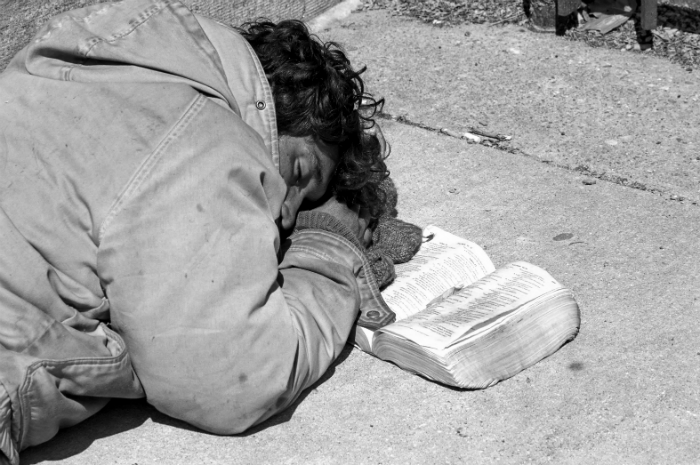Open your Doors
Does Jesus call us to help those who are destitute – or something more? By Michael Manning

On the ragged edges of a global empire, where wealth and power have uprooted the traditional assumptions and ways of life, where the elite enrich themselves at the expense of the poor, where debt traps workers in cycles of poverty, where inequality and insecurity mix with the rumours of terrorists abroad, where everyone knows that there is no alternative to the system, a ramshackle band led by a homeless man dreams of something different.
Their naivety is almost endearing even if their rhetoric seems extreme and dangerous. Worse, they radicalise people.
The weather turns and seasonal nightshelters prepare to open their doors for another winter. Up and down the country community groups, churches and charities prepare themselves to accommodate people through the harshest months of the year.
This is vital work. It keeps people alive. It is a practical expression of compassion and hospitality to some of the most vulnerable people in our society.
It is needed now more than ever. But it is just a sticking-plaster.
Homelessness is not one thing, but a symptom of a whole cancerous mass of causes gnawing away at the fabric of our society and humanity. Homelessness points to communities isolated and torn apart, unable to hold together the fragile bonds that knit us to each other, unable to cope with the distress caused by poverty, mental ill health, trauma and breakdown. We need the sticking-plasters and we need more of them but we shouldn't lose sight of the deeper problems. When you're a hospital treating people coming in again and again with awful wounds you try to heal them, but you also begin to ask what's causing the pain in the first place. More and better hospitals won't end a war; only making peace will.
It is taken as read that it's a good thing for Christians to support services to the destitute. It's in our DNA, as the Christian roots of hospitals and care for the poor show. But the invitation runs deeper than service. The poor inherit the kingdom and Jesus knew that the very existence of such people pointed to the blinding injustice of the status quo. He didn't build coalitions of the willing to harness their vast resources to pour philanthropy on the needy masses. He urged people to follow him there, to sell what they had, to take up their cross, to inherit a kingdom.
Where people are mentally and physically pushed to the edge by systems of power and privilege you can be sure that you will find Jesus there. Following a homeless King means going there too, with a willingness to build costly relationships and an openness to being transformed. It means inviting people into our spare rooms and round our dinner tables. It means re-arranging the way that we work and the way that we live to make room for the marginal. It means getting angry about the state of society and shouting to change it. It means being not just for, but of the poor.
We need to know people's names, not just the charities that support them. We need to fill up our homes and our buildings. We need to advocate for better mental health services and supported accommodation. We need to make ourselves less busy to ensure we have room and capacity to offer hospitality. Community houses, shared finances and a willingness to explore imaginative alternatives to those modelled by the mainstream are all needed.
The invitation is always there and yet we remain reluctant to take Jesus up on his offer of transformation. We're happy to hear his talk of being born again but unwilling to take him at his word about the poor and the kingdom. Jesus points to something better than a tired model of the rich helping the poor. He points to a radical equality and sharing of life. He points the way to a mode of living together where communion overcomes suspicion and strangers are blessings rather than threats.
We should indeed pour out ourselves – our finances, our churches, our time, our food, our shelter, our spare rooms – for the homeless. But we should also begin to ask together whether the people on our doorstep are less recipients of our aid and more signs that a new kingdom is needed. Perhaps we need to hear again the invitation from the one standing at the door and knocking, seeking to come in, seeking to eat with us. Bringing a glorious new kingdom.
Picture: Leroy Skalstad / freeimages.com
Michael Manning is a co-ordinator of Graih, a charity serving those who are homeless and in insecure accommodation on the Isle of Man. He lives with his family in a shared household and belongs to Broadway Baptist Church in Douglas
He is the author of No King, But God - Walking as Jesus Walked
Baptist Times, 10/10/2016